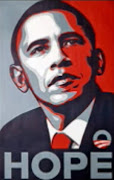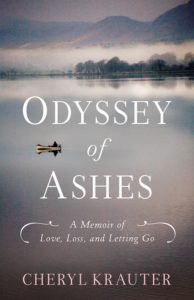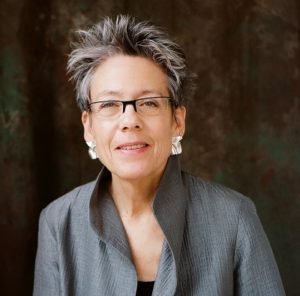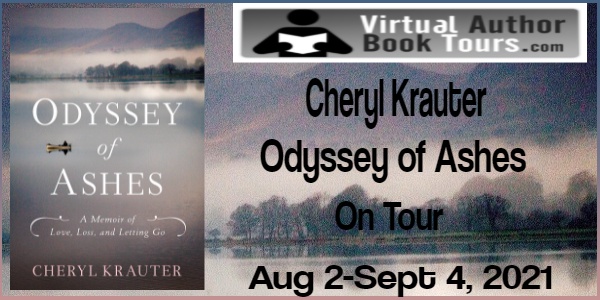Joy Renee: Let me begin by saying I'm so honored to have read your story and to now be asking you questions.
You mention that you were raised in Washington State as was I so I'm curious if either you or John ever fished any of the rivers I've lived near. I was born and raised in Longview which is where the Cowlitz river meets the Columbia. I also lived for more than a decade in the Rogue Valley Oregon where my husband was born and raised.
Cheryl: I was born in Bellingham, Washington in 1951 and, of course, have no memory of my short infancy there. My father was in the FBI and was transferred to Richland where he must have been involved with the Hanford Project in some capacity. I have wondered if the aggressive breast cancer I was diagnosed with in 2007 was in some way impacted by my life as a toddler in this area, playing outside in the dirt, drinking the water, and so on. Richland was known in the 1950’s as “The Atomic City of the West” and held festivals celebrating nuclear energy with pride. We moved to Mercer Island, Washington when I was about four years old where I lived until I was eleven years old when my family moved to Los Angeles, California. I have a great affinity for the Pacific Northwest and my oldest friend, Bill who still lives in Seattle, shows up in many pages of Odyssey of Ashes: A Memoir of Love, Loss, and Letting Go.
We have fished the Hoh River on the Olympic Peninsula. I know that John fished the area of Rogue Valley. We fished small streams in the Dunsmuir area of Northern California as well as the Sacramento River, and streams in the Lake Tahoe area of California. Odyssey of Ashes features fishing adventures in Montana, together in 1988, and then my solo journey in 2017 to scatter John’s ashes by the Madison River.
Joy Renee: You noted on your visit to the mortuary that there were no sacred symbols. Seen through the lens of a business model catering to a community with multiple traditions this seems obviously sensible. Let the griever bring their own tradition and narrative to a blank slate. But it is also becoming more common in our culture for people to have become disconnected from their sacred traditions of origin without replacing them and thus their encounter with the blank slate mortuary becomes their experience of the rituals surrounding the death. Do you think the presence or lack thereof of a sacred tradition, narrative and symbolism plays a significant role in a griever's ability to process what is happening to them?
Cheryl: American culture has a profound absence of ritual around death. I suspect some of this relates to our insistence on praising a culture of youth above recognizing the wisdom of the elders. The historical foundation in America of Judeo- Christian traditions promises entry into Heaven or a deep fall through the Gates of Hell and personal stories or beliefs are seen as a rebellion against traditional religious doctrine. Throughout history any waft of a pagan spell could mean ostracism or death. Women who practiced rituals were labeled witches and suffered the flames of fire. I also think that a pervasive denial of death creates a sterile, hasty attitude that sanitizes memorial services. The oppressive attitude to quickly get through a period of mourning and move on is cruel to those who are grieving. People feel ashamed to weep, to be “out of control” when grief arises. There is an odd pressure to be stoic as if that symbolizes strength and courage in the face of loss. I was instructed prior to one memorial I attended that it would not be sad occasion but a celebration, a party where we wouldn’t have to feel bad about the death. Native traditions allow for more of a journey and speak of visitations or visions of the dead. Western culture tells us to look away from our mortality and to shield younger people from this reality, robbing them of the experience of being with loss and learning resilience. When personal beliefs are not encouraged mourning becomes a “rush job”, something to “get through” rather than to authentically experience.
In Part II of Odyssey of Ashes, scenes are woven between the creation of an altar during Los dias de los Muertos and, in this way, shows how ritual can offer a way to acknowledge and honor the dead while giving those of us still living an opportunity to be present with our own thoughts and feelings. Throughout the memoir, there are meditations, myths, and rituals that speak to the deep expression of grief as personally transformative.
Joy Renee: As you were describing the role of the River Guides in flyfishing tradition and the importance of the etiquette developed by their enclave over the centuries, it occurred to me that the terrain of grief is also a wilderness of mysterious shoals and treacherous weather in need of rules of etiquette and River Guides and I was trying to formulate a question as to whether you had found such help on your journey but then it occurred to me that it is memoirs like yours that have become my River Guides. This extended metaphor opens up so many questions and caveats I'm not quite sure how to ask. I am sure that though it has been of great help the memoirs haven't been enough and that is probably because text on a page can go only so far. So maybe it is truer to see the memoir writers as the Izaak Waltons which would give the 'River Guide' role to something more hands on.
This privilege of reaching out with my questions to the author does add something helpful to the experience but I'm aware that it is a rare privilege and it is still text on a page.
Could you riff a bit on that extended metaphor of grief being a terrain in need of rules of etiquette and guides and whether you found such help and if so, was it enough and whether you think our culture could do a better job of providing it.
Cheryl: As a therapist, I am a River Guide, a Sherpa, a companion who travels the terrain of grief, the caverns of darkness in which the soul can get lost without being accompanied by someone who knows how to hold the light. Sometimes I see myself as a minor with one of those headlamps around my head leading the way. Sometimes I am only a breath ahead, sometimes I am walking alongside, occasionally I am behind, but always with my eyes on the person who I am guiding along their way. The River Guide knows the river, where the fish lie, how the currents are running and, most essential, studies the hatch that the fish are feeding on so that the flies used in casting the line will match the tasty treats a trout will devour. A River Guide has lived with the river, is familiar with its waters, its twists and turns, yet also knows that the river is constantly changing and will not be the same one she waded yesterday.
I do not believe that is enough to read a book about grief, yet I feel that memoir, as well as other books on grief, may help the reader feel less alone in their pain. Sometimes the reader feels less “crazy” in hearing about the experiences of another. We are talking about take-away from the written word as a possibility to soothe heartache or maybe even evoke it as a way to connect within the aching heart and find a deeper, meaningful expression of grief. The landscape of loss is explored and discovered by each of us in our own time and in our own unique way. I do not have a formula, I have no map, no GPS. Those techniques are better left to those who guide people who need that type of structure. In the end, there is no right or wrong way to travel the terrain of grief and loss.
Those who read Odyssey of Ashes: A Memoir of Love, Loss and Letting Go will travel with me on my own journey from the moment of my husband’s sudden death to the rivers of Montana, through storms and tears, live with me in my daily urban life, and, hopefully, gain some solace and peace for themselves.
Joy Renee: OK This question isn't inspired by your story but rather personal from one griever to another and I keep going back and forth on whether it is appropriate to even include it. So, I'm going to leave it up to you whether you wish to answer and if you do whether you prefer, I left if off the published interview: Either before or during your own grief journey have you noticed that our culture treats some grief as more legitimate than other grief? I can think of two categories but there may be more. Infants not carried to term or born too sick to thrive is one. Another is those who passed due to either intentional or negligent self-harm. I witnessed the first in the past and am living the second as my husband was an alcoholic. I'm wondering if the experience of feeling pressured to move on quicker, to feel relieved or even grateful rather than devastated and shamed if you persist is common to our culture or unique to my family and/or faith tradition.
Cheryl: To devalue and delegitimize any grief is inhuman. Unfortunately, it does happen but I am seeing this start to change as people are more open to expressing types of losses that may previously have been invalidated. The loss of a child through miscarriage was often overlooked in the past but now is recognized as a painful experience. The loss of a child at any stage of life is unbearable for many people to acknowledge and the grief from that type of death may remain a silent wound. The stigma of mental health fuels the difficulty of acknowledging a suicide. People tend to be terrified of this type of death and, indeed, often are judgmental due to that fear. Again, this bias has begun to slowly shift as more people are willing to courageously come out with their stories. I have also counseled people who felt shame that they were, in fact, relieved, when someone who has been difficult dies. The death of a beloved pet can also be minimized even when that pet may have been the most important companion to the person who is grieving. As grief work is moving out of the shadows, I believe some of these previously “unspeakable” losses can come to light.
Comments I find particularly insensitive have to do with elderly people dying. “Oh, it was their time.” “They had good life.” Those who mourn that person are then expected to shut up and not feel their grief.
I have spoken to the culture pressures of “getting on with it” in response to the other questions. Individual family cultures and particular faith-based cultures have their own restrictions on personal expression but that would be unique to each person.
(You are welcome to share these thoughts on your blog if you want.)
Joy Renee: Thank you so much for your story and for giving attention to my questions. I hope the blog tour has really given your story wings.
Cheryl: Thank you, Joy Renee. I appreciate your questions and the opportunity to write something for you.















